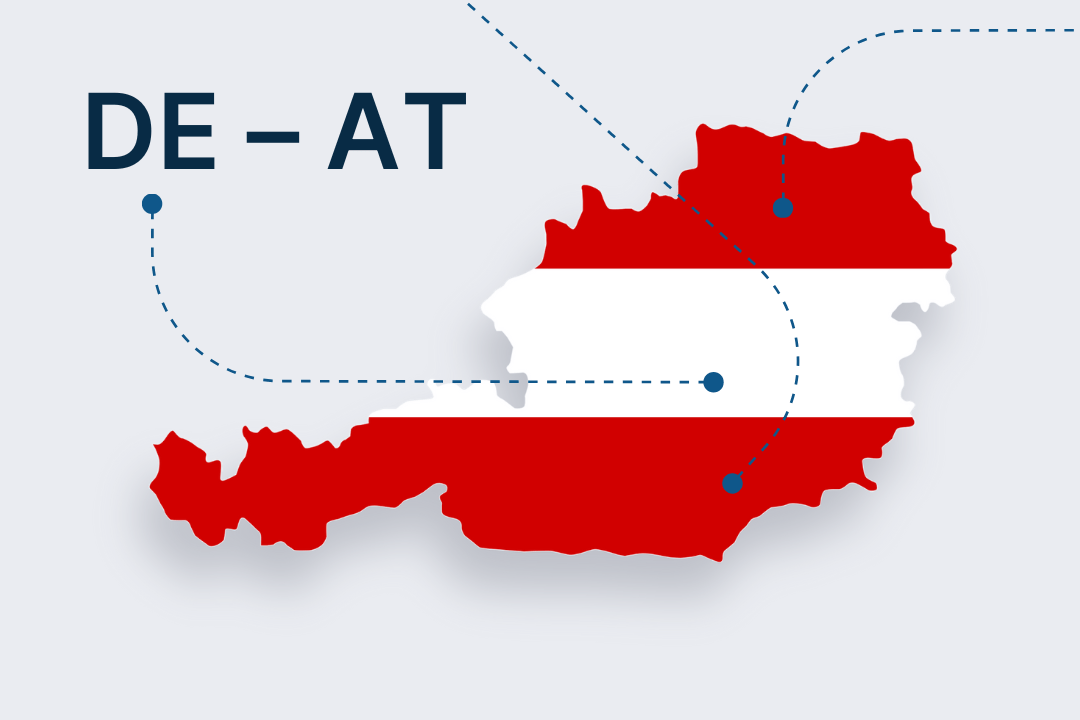Market information and tips on taxes, payments and returns management for shippi...
E-commerce calendar: The most important international shopping festivals in online retail
We show you the most important international shopping days in e-commerce and why cross-border business to Switzerland, the UK and Norway is worthwhile.

We show you the most important international shopping days in e-commerce and why cross-border business to Switzerland, the UK and Norway is worthwhile.
Which international shopping festivals should online retailers keep in mind? In this article, we explain the importance of international shopping events for online retailers and explain why cross-border business is particularly profitable in Switzerland, the UK and Norway.
The importance of shopping festivals for retailers in e-commerce
(International) shopping festivals play a decisive role in e-commerce. They not only enable a short-term increase in sales, but also create long-term benefits for customer loyalty and brand awareness. The reason: targeted discount campaigns, special offers or exclusive promotions on certain days allow online retailers to attract the attention of consumers and boost sales of their products in the online store. Surveys, for example by Mastercard, show that people prefer to shop online on promotion days.
Not only does this lead to record-breaking sales, it also creates the opportunity to attract new customers from both domestic and international markets. Promotional days create a sense of urgency and exclusivity worldwide: 21 % of Swiss shoppers stated in a 2020 study that they prefer to shop online on Singles Day. In another study conducted by Profital in the fall of 2023, 76 % of Swiss shoppers said that they explicitly inform themselves about offers before Singles Day and Black Friday. Overall, 36 % of all cross-border purchases in Switzerland are made in Germany.
In addition to Switzerland, cross-border business to the UK and Norway is also relevant for German online retailers. 93 % of all British people shop online, in Norway it is 81 % of consumers. Overall, Norwegian online retail currently generates sales of around 12 billion US dollars. According to forecasts by Statista, it is set to grow by 13.28 % annually until 2025.
The high purchasing power in both countries is particularly visible during the peak season: around 31 % of British people currently buy their Christmas presents online. Based on figures from previous years figures from previous years, an increase in online purchases on Black Friday can be assumed for Norway: in 2019, 35 % of Norwegian participants intended to buy on Black Friday. In 2020, this figure was already 45 % and rising.
It is therefore worthwhile for online retailers from Germany to also observe international campaign days in order to generate cross-border sales.
International shopping festivals: The 2023/2024 e-commerce calendar
There are international shopping days throughout the year. However, most of them take place in the peak season between the beginning of September and the Christmas season. We have summarized the best-selling shopping days for Germany, the UK, Switzerland and Norway here.
It is best to mark the following dates in your calendar to ensure not to be surprised by the increased sales on international and country-specific shopping days:
Singles Day
Originally from China, Singles Day on November 11 has become a global trend. It is often described to be the biggest shopping day in the world and the most important e-commerce day of the year: Singles Day now generates more sales worldwide than Black Friday and Cyber Monday combined, according to statista.de. The major Chinese e-commerce platforms alone generated a conversion of over 145.2 billion Euros around November 11 this year.
The day was originally seen as a counterpart to Valentine's Day for single people who wanted to treat themselves to something special when shopping online. Today, Singles Day is the first shopping day in November to mark the start of the Cyber Month and a significant increase in online shopping.
Black Friday
Black Friday, traditionally the day after Thanksgiving in the US, is known worldwide for extremely high discounts and exclusive offers. It always falls on the fourth Friday in November. In 2023 it was November 25, in 2024 it is November 29.
For online retailers, this day is one of the most important shopping days: in 2021, there were 88 million shoppers worldwide on Black Friday. The US shopping day has also established a strong position in Switzerland. According to blackfridaydeals.ch, the Swiss spent around 115,000 Francs in online stores on Black Friday 2023. The average shopping cart value in 2023 was around 250 Francs.
We explain in detail how you can make profitable use of Black Friday in e-commerce in our article "Black Friday in e-commerce 2023: How to delight customers in Switzerland and the UK despite the peak".
Cyber Monday
Cyber Monday directly follows the Monday after Black Friday. In 2024, Cyber Monday is on December 2. This day online retailers in e-commerce increasingly focus on exclusive online deals: customers can access attractive online offers from the comfort of their own home and shop without stress.
So this day is a key event for online retailers to continue strong sales after the Thanksgiving weekend.
Some companies even organize an entire Cyber Week in the period between the Monday before and after Thanksgiving. For the year 2023, Adobe Analytics analyses showed that the British spent 3.45 billion Pounds online between November 24 and 27 - during Cyber Week - including 1.04 billion Pounds on Black Friday and 2.41 billion Pounds during the rest of Cyber Week. This is an increase of 5.6 % compared to the previous year.
Green Monday
Green Monday takes place on the second Monday in December and is often seen as the last opportunity for online shoppers to get their orders placed in time before Christmas. Retailers around the world offer attractive deals on this day to attract customers looking for last-minute gifts. Green Monday marks a peak in Christmas sales and helps to ensure that online retail remains strong until the last minute before the holidays.
The shopping day was originally launched by eBay in 2007 as a "green alternative" for Christmas shopping. The intention: by leaving the car at home and not driving from store to store, CO2 emissions are reduced. With the right marketing strategy, shoppers from Switzerland, Norway and the UK can be reached on this day as well.
Christmas business
Christmas business extends over the entire period of Advent, with December traditionally being the month with the highest sales. Online retailers benefit from the increased demand for gifts, decorations and other Christmas products. Almost 83 % of Germans and a good 25 % of Swiss buy Christmas gifts online.
Boxing Day
Boxing Day is one of the most important shopping holidays in the UK and is celebrated on December 26. It is in no way less popular than Black Friday when it comes to impressive discounts on consumer goods.
In contrast to Black Friday, which symbolizes the start of the Christmas shopping season, Boxing Day marks its conclusion. The idea behind this shopping day: retailers who have full Christmas stocks want to sell it before the end of the year and therefore offer their goods at huge discounts.
Dry January
Dry January runs throughout the month of January tand has become an important period for the health and wellness trend. Originally, Dry January was a health campaign calling for people to abstain from alcohol throughout January. The campaign has become particularly popular in the UK, Switzerland and Germany. Following its great success in its country of origin, the UK, the campaign also became increasingly popular in other Western countries between 2010 and 2020.
In Switzerland, the project has now become a well-established movement (dryjanuary.ch). Online retailers can benefit from this by providing special offers for alcohol-free products, fitness equipment or healthy food. Customers who are focused on their health are looking for suitable products online more and more during this time.
Valentine's Day and Mother's Day
Valentine's Day on February 14 and Mother's Day are well-known occasions for gift shopping. In many countries, including Germany and Switzerland, Mother's Day is always celebrated on the second Sunday in May . British Mother's Day, on the other hand, takes place on the second Sunday of Christian Lent. This begins on Ash Wednesday and ends on Holy Saturday - so the date of Mother's Day in the UK can vary from year to year.
Unlike the date, the most popular gifts are the same across countries: flowers are the most popular gifts for mothers, but chocolates, books, jewelry and perfume are also popular gifts. Perfume is a particularly popular gift on Valentine's Day, closely followed by chocolate, flowers and vouchers.
St. Patrick's Day
St. Patrick's Day is originally an Irish holiday dedicated to the patron saint St. Patrick. It is one of the best-known traditional British holidays. For online retailers, this holiday, which is now celebrated worldwide on March 17 with parades, green festivities and celebrations, is a good opportunity to increase the sales of their stores in the first quarter with themed promotions and unique discounts.
Norwegian National Day
The Norwegian National Day, also known as "Syttende Mai", takes place on May 17 and marks the signing of the Norwegian constitution in 1814 and the country's independence.
Norway celebrates this day with numerous festivities and large parades. Before the national holiday, Norwegians often buy clothing and decorative items online, so German cross-border retailers should also keep this day in mind.
Swiss National Day
The Swiss National Day is celebrated on August 1st and commemorates the founding of the Swiss Confederation in 1291. It represents the spirit of unity that brings together the different regions, languages and cultures of Switzerland. Swiss history, values and traditions are celebrated in our neighboring country on this day.
For online retailers selling to Switzerland, the day can be a good opportunity to boost sales with special discounts for customers resident in Switzerland or themed promotions.
Back-to-school season
The back-to-school season marks the start of the school year after the summer vacation from the end of August to the beginning of September. It is considered the second biggest retail season after the winter holidays: in 2022, the average US household spent 864 US Dollars. School supplies and new clothes in particular are bought during this period.
This promotional period has also established itself in marketing in the UK. Many online stores offer reduced prices on technology products, pens, exercise books and anything else you might need for the new school year.
Halloween
Originally based on Celtic customs, Halloween has achieved global status in recent years. On October 31, people around the world dress up and celebrate this day - especially in the USA and UK.
The demand for costumes and decorative items is particularly high. In the weeks leading up to Halloween, sales of costumes, decorations such as pumpkins, skeletons, party items and sweets increase significantly. This makes Halloween the fourth best-selling day during the following peak season. In fact, 40 % of Halloween purchases in the UK are made online.
A final look at the calendar makes it clear: the period around Christmas is particularly strong in terms of sales and offers a great opportunity to end the year with a sales high. In order to make effective use of these shopping days, you need to take a close look at customer preferences, personalized communication and efficient processing of cross-border sales.
Below, we give you some tips on how to prepare for shopping days and master cross-border business without any hassle.
Shopping festivals: How to prepare for peaks in online sales
Shopping days are both a joy and a sorrow for online retailers. Whether it's Black Friday, Cyber Monday or Valentine's Day - shopping festivals drive up sales. However, those who sell internationally quickly face challenges when handling the increased parcel volumes. Fast and on-time deliveries or the handling of returns in particular push many online retailers to their limits, as the customs and tax regulations mean a considerable amount of additional effort, especially for shipments to countries outside the EU.
As an online retailer, you should therefore prepare a few things before the peak season:
1. Check website and technology
Ensure that your website can handle the expected traffic. Check the loading times, optimize the user interface and make sure that the payment processes work smoothly. Mobile optimization is particularly important.
2. Develop a marketing strategy
Plan your marketing campaigns at an early stage. Use email marketing, social media and other online channels to draw attention to your offers. It is important that you know your markets and target groups well. Personalized offers and discounts for existing customers strengthen customer loyalty and increase the motivation to buy in international cross-border e-commerce.
Customized marketing strategies that meet the needs of buyers in Switzerland, Norway or the UK attract attention and increase your reach on country-specific shopping days.
3. Check data from the previous year
Collect data from the last few years regarding sales on shopping festivals. This will allow you to forecast the logistical effort and orders better and, if necessary, employ enough staff on the days to take care of customer service and processing. Also take into account country-specific trends and look at the statistics for all the countries you sell to separately.
The same applies to returns: how many shipments were returned from where? Also calculate the return process for each country.
4. Plan pricing strategy and select products
Of course, you are not the only online retailer offering discounts and attractive products. Think carefully about which products you want to highlight and what prices you set to ensure both profitability and attractiveness for customers. Also consider currency conversion in other countries.Also consider exchange rates in other countries.
5. Optimize inventory and logistics
Make sure that your warehouse is stocked properly. Restock early to avoid bottlenecks. At the same time, you should review and optimize logistics processes to ensure smooth domestic and international shipping.
Customers expect a fast and transparent shipping process even during the peak season - regardless of whether they are buying within Germany or from countries such as Switzerland, the UK or Norway.
The shipping time for cross-border sales in particular is often underestimated and not only causes stress during processing, but also frustration for international shoppers. After all, they expect to receive all products fast and on time - regardless of when and where they shop online. Plus: more orders in cross-border shipping always lead to more customs declarations and returns that need to be processed.
However, with exporto by your side as an end-to-end solution for cross-border e-commerce to Switzerland or the UK and Norway, you no longer need to worry about these issues.
Successfully manage shopping festivals in e-commerce with exporto
It is important for online retailers to know not only the local or international promotion days. They should also know which special promotional days are relevant in the individual countries in which they sell. With the right partner, you as an online retailer can not only successfully master such promotion days in cross-border e-commerce, but even use them profitably. exporto helps you to make your logistics processes more efficient and be prepared for peaks at all times: Our solution not only includes the collection of parcels, but also fast delivery within two to three working days by local carriers in the destination country. The automated technologies ensure a transparent and efficient supply chain - regardless of the number of orders.
At exporto, we also help you to process customs and tax issues efficiently. This ensures that the shipment of international orders is not delayed by bureaucratic hurdles. We also help you to implement personalized shopping experiences: Transparent returns management precisely meets your customers' expectations for a service tailored to them with simple returns processes.
We also work with professional marketing agencies in the respective countries, which we will be happy to put you in touch with. This allows you to optimally tailor your marketing activities to your target markets outside the EU and have professionals at your side who are very familiar with the countries and ensure that your campaigns - for example around country-specific campaign days - are perfectly tailored to the needs of the respective target group.
To ensure that you are well prepared for the next campaign days, simply contact us without obligation using the contact form.
About the Author
Katharina Knoop
As Marketing Manager for exporto GmbH, Katharina Knoop is coordinating the planning, production and publication of content relating to all aspects of cross-border e-commerce for over 3 years.
Cross-border insights straight to your inbox
Related Posts
Opportunities and strategies for German online retailers
3 minute read
This allows British online retailers to tap into the German e-commerce market wi...
8 minute read
What requirements do German online retailers currently have to comply with when ...



Comments